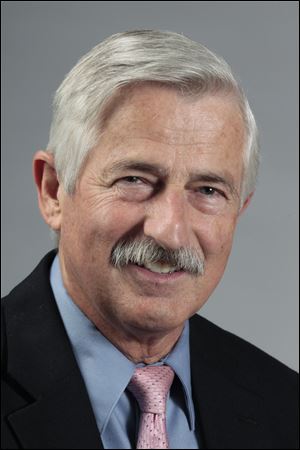
COMMENTARY
To athletes who fancy themselves warriors: Think again
11/4/2013
Walton
As a sports fan, I truly appreciate the talent and skills that separate the best athletes, the professionals at the top of their game, from the rest of us, including those who try to play their game anyway as fumbling, bumbling amateurs.
But my admiration has its limits, especially when I hear a professional jock compare himself to the bravest among us: Our fighting men and women.
I’m not speaking of any particular athlete here, and this is just a paraphrased quote, but I’m sure you’ve heard it or a variation of it: “I love these guys. We’ve been through so much adversity. We go to war together every day.”
Well, I play on two amateur baseball teams, and while I have genuine affection for my teammates, none of us would contend that we go to war together when we step on the field.
I just want to grab these pampered pros by the shoulders and say: “No, you do not go to war every day. You play a children’s game with a ball and a stick, and if you play it well, you are rewarded with riches you never imagined as a kid.”
The average salary in Major League Baseball last season was $3.2 million. Even the minimum salary required by MLB’s contract with the players and their association is $480,000. That’s more than a lot of Americans see in their lifetimes, and that’s the low end.
At the high end of the MLB pay scale, an athlete who plays especially well can earn absurd amounts. The Yankees’ Alex Rodriguez is the poster boy — and the whipping boy — in any discussion of athletes’ pay, and why not? He received $29 million last season, even though he missed more than half his team’s games because of injury. He continues to draw his pay after dishonoring the game and himself with a scandal of his own making.
What does a soldier make who does his job especially well? A corporal with two years of service gets $2,081 a month. If he’s on the front lines, risking his life for his country and for a player’s freedom back home to pursue unimaginable wealth, he gets an extra $7.50 a day in combat pay.
Mr. Rodriguez makes more during a massage from the Yankees’ trainer than a soldier in constant danger in a war zone gets in a month. Does something seem a little out of whack here?
Team sports borrow from military terminology all the time. Baseball managers “platoon” a right-handed hitter and a left-handed hitter. After a few tough losses in a row, they might stress the need to “soldier on.” Football coaches speak of the importance of the “squad” and maintaining “tight discipline.”
I care a lot more about a platoon of American soldiers in Afghanistan than athletes who are grossly overpaid to entertain me.
If you want to talk about tight discipline, consider the courage it takes to drive a Humvee down a dusty road and wonder whether this is the day your vehicle hits an improvised explosive device buried in the dirt beneath you.
A ballplayer who loses focus and makes an error might face the wrath of an angry coach. A Marine whose concentration wavers might lose his life.
A player who pulls a hamstring might end up on the disabled list for two weeks. A soldier who takes a bullet might end up on the disabled list for the rest of his life — if he or she survives.
Baseball is a game. War is not. Keep that in mind on Veterans Day next Monday.
War puts our youngest adults — some of them still kids, really — in a fight for their lives. Far too many of them never come back. The endless war in Afghanistan has claimed more than 2,100 Americans — so far.
War devastates families who have to bury a son or daughter, a husband, a brother. Wars cost great sums of money, once more than $238 million a day in Afghanistan, not that the monetary cost can even begin to compare to the loss of our best and bravest.
Wars are fought and one day wars end, presumably even in Afghanistan. And for what? We failed in Vietnam and lost more than 58,000 of our countrymen, nearly all of them contemporaries of mine. I’m proud of my Army service, but I still feel a measure of guilt that friends of mine died while my deployment was safe and secure here in the States.
I’m sure most professional athletes truly do appreciate and admire our fighting forces. However, I can also imagine hearing one of them say: “Hey, they volunteered for what they’re doing. Nobody put a gun to their heads.”
Exactly. Nobody had to.
Thomas Walton is the retired editor and vice president of The Blade. His column appears every other Monday. His commentary, “Life As We Know It,” can be heard each Monday at 5:44 p.m. on WGTE-FM 91.
Contact him at: twalton@theblade.com